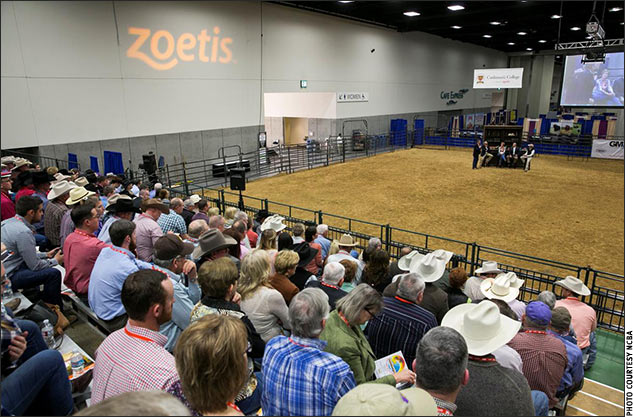
Cattlemen’s College Opens Cattle Industry Convention
Educational venue attracts more than 900 attendees to kick off the cattlemen's convention.
SAN DIEGO, Calif. (Jan. 27, 2016) — Two days of robust producer education set the tone for the 2016 Cattle Industry Convention Jan. 26-27. Sponsored by Zoetis Animal Health, Cattlemen’s College® is known as one of the most thorough and beneficial educational events in the country designed specifically for cattlemen and women. Celebrating its 23rd year, the event attracted more than 900 attendees.
“This educational program provides an impressive diversity of topics to beef producers,” said Josh White, NCBA executive director of producer education. “We have producers speaking to producers about real-life ranch issues, industry partners presenting consumer expectations and academic leaders providing the latest findings in cattle research. The best of the best in the cattle industry are selected to speak at Cattlemen’s College to help producers propel the beef industry forward.”
A "Whole Herd Makeover" discussion kicked off the event Tuesday night, highlighting perspectives about what the U.S. cow herd should look like in the future. Tom Field, David Daley, Patsy Houghton, Tom Brink and Don Schiefelbein shared their perspectives about what the cattle herd should look like in the next five years. These influential speakers commented on genetics, land prices, health protocols and beef marketing.
Cattlemen’s College started back up Wednesday morning with a keynote address from Robert Fraley, executive vice president with Monsanto, who is a respected leader in agriculture biotechnology. Fraley spoke frankly about how the agriculture industry will use technology to feed more than 9.5 billion people by 2050, with two times the food demand by that time.
“We will have to produce more and waste less to get there,” said Fraley. “I absolutely believe that we have the tools and technology to do that.”
This year represents the 20th anniversary of the introduction of GMOs, which were first used in agriculture in 1996.There are about 30 countries growing 450 million acres of GMO food; there have been more than 4 billion acres of GMO crops over the last 20 years, according to Fraley.
Fraley said skepticism remains among some consumers about the use of science in agriculture. “There is clearly a gap between what science can do and what consumers are comfortable with,” he said.
Throughout the day attendees chose from a total of 18 classes within the topics of Healthy Cattle — Healthy Ranch, Advances in Cattle Nutrition, Industry Hot Topics, Your Business — Our Industry, Evolving Beef Production, and Creating the Future. The range of informative, hands-on workshops were created for cattle operations of every size and sector. Cattlemen and women of all age groups were in attendance, but young beef producers especially made a strong showing.
“We had more than 140 collegiate students preregister to attend Cattlemen’s College this year,” said White. “As we think about the future of our industry it is encouraging to see young people keen to learn and get involved. Students absorb a lot of high-quality education over several days, as well as make important connections in the industry.”
Audio presentations from the 2016 Cattlemen’s College will be available online following the Cattle Industry Convention and NCBA Trade Show. Cattlemen and women who were unable to attend the event in San Diego can take advantage of this online option at http://www.beefusa.org/.
Editor’s Note: This article is adapted from a news release provided by the National Cattlemen's Beef Association, which can be found on the organization's website at www.beefusa.org.

